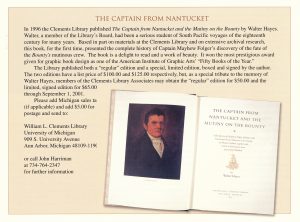The Captain from Nantucket and the Mutiny on the Bounty
Walter Hayes
The William L. Clements Library
1996
courtesy of the William L. Clements Library. http://clements.umich.edu
from “The Quarto”, the Clements Library Associates newsletter:
In 1996 the Clements Library published The Captain from Nantucket and the Mutiny on the Bounty by Walter Hayes. Walter, a member of the Library’s Board, had been a serious student of South Pacific voyages of the eighteenth century for many years. Based in part on materials at the Clements Library and on extensive archival research, this book, for the first time, presented the complete history of Captain Mayhew Folger’s discovery of the fate of the Bounty’s mutinous crew. The book is a delight to read and a work of beauty. It won the most prestigious award given for graphic book design as one of the American Institute of Graphic Arts’ “Fifty Books of the Year.”
The book’s introduction:
The mutiny on the Bounty has retained its power of fascination for two hundred years. What began as an armed insurrection has been transformed over time into near myth, casting a spell all its own on poets, historians and Hollywood producers in its passage from dark adventure to pastoral idyll. The five films and many more novels it has inspired pale beside the truth and the half-truths; unresolved mysteries remain and dedicated Bligh or Christian loyalists still wage a partisan war of words.
What other sea drama provided two such psychologically absorbing roles for its principle players or so stirring a conflict between them? Where else, in the scope of one story, can we share the vicarious pleasures and dangers of an enchanting tropical island with its noble savages and pagan beauties, an astounding voyage in an open boat – rarely equalled as a feat of navigation and daring – and all the guilt and passion for the forbidding fortress where its villains were to find death and redemption?
No other adventure at sea had produced so large a literature and, indeed, the story is so well known that it might be thought there is nothing left to say and precious little to add. The discovery, however, of a hitherto unsuspected manuscript in the papers of Samuel Coates, a Philadelphia merchant – now in the possession of the William L. Clements Library of the University of Michigan – inspired a long search among British Admiralty papers and archives from New England to Hawaii and this lead to further fascinating discoveries. The revelations of old, faded letters and ships’ Logs from long ago have now made it possible to make public some engaging and important documentary evidence, pay tribute to a forgotten American sailor and give proper prominence to his crucial role in the Bounty affair.
He was a Nantucket sea captain. His name was Mayhew Folger. He was a frugal, resolute Quaker who could trace his descent from the same roots as Benjamin Franklin and it was he who discovered the last mutineer on Pitcairn Island, solving a mystery that had captivated the world for twenty years, as it still does two centuries later.
It is not surprising that the search for Mayhew Folger proved a long and frustrating enterprise, for all its rewards. The voyages of America’s early seamen unusually turn up as little more than footnotes in the annals of exploration. The captains courageous of Nantucket rode their little ships from the top of the world to the bottom with stoic determination and unshakable faith. True to their Quaker upbringing, they were men of few words and fewer vanities. None of his contemporaries thought it remarkable when Folger ventured as far as the ice barricades of Antarctica in search of seal colonies and their skins or took his final harvest for sale in China. His friend, Amasa Delano – who also has a part in this story and was descended from the same Huguenot stock that produced Franklin Delano Roosevelt- sailed three times round the world in the course of his sealing and surveying voyages and would be little remembered now had he not published a narrative of his travels in Boston in 1817. He was one of the first two or three American sea captains to commit his adventures to paper, providing incidentally the inspiration for one of Herman Melville’s novels. But the Nantucketers had been roaming the oceans for a hundred years before that and kept their pens and ink for terse Log entries and formal letters to their wives who stayed behind with large and demanding families.
Since no Pacific venture could avoid passage round Cape Horn or through the southern oceans – nor the dangers of hostile natives and Spanish garrisons – it was a wonder they and their little ships even survived. The Bounty, built at Hull on the north-east coast of England for the British coastal trade, was only 84’6” long and 24’20” wide with a burden of 215 tons, but many of the Nantucket sealers were a great deal smaller than that. Perhaps that was why their captains judged Captain Bligh and Fletcher Christian in a more kindly fashion than is habit today. They knew what it was like to sail the inconstant sea, out of sight of land for months on end, cramped in cabins or below decks where privacy was an unattainable luxury.
Walter Hayes


